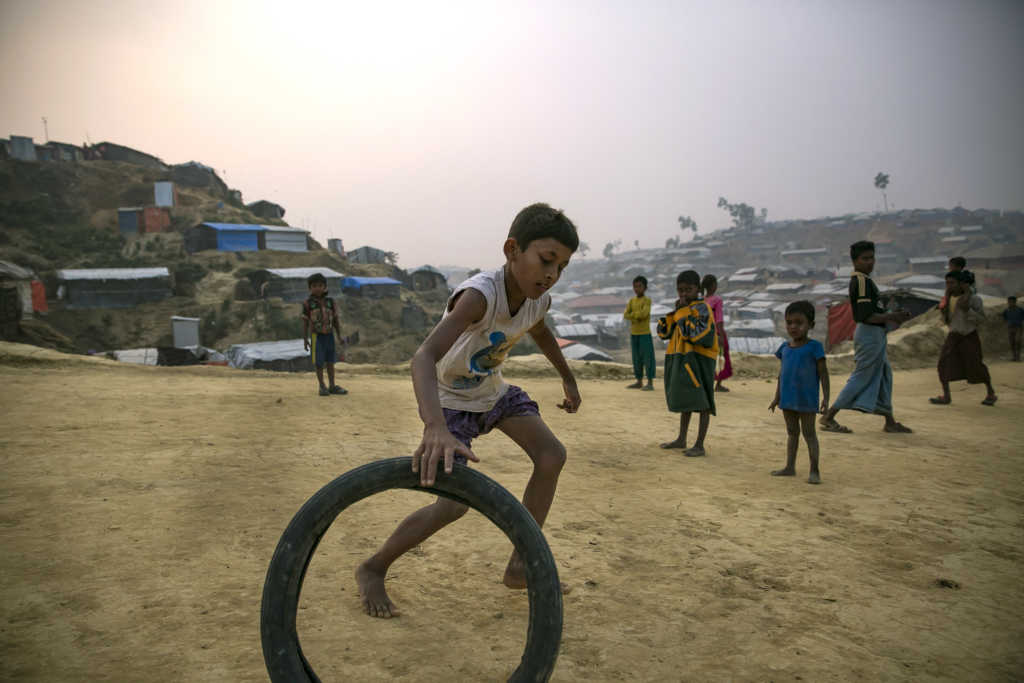It was almost 30 years ago, in 1978, that a Rohingya woman named Marium* first fled to Bangladesh.
The Burma Army was launching a campaign against the Rohingya people in Burma’s Arakan State. According to Marium, the military actively kidnapped, tortured, and raped civilians while burning villages to the ground.
For nine months Marium lived in the refugee camps in southern Bangladesh. She and others were told by the Bangladesh and Burmese governments that it was safe to return to their homes, or what was left of them, she recalls. Some of the refugees, including Marium, made the trip back across the Naf River while others stayed in the refugee camps, etching a life where they could and out of the reach of the Burma Army.
Fast forward to today. Marium is back in the refugee camps in Bangladesh, now sitting next to a 40-year-old Rohingya woman named Sameera*. They’re just two of the estimated 700,000 Rohingya who have recently fled Burma in search of safety from the Burma Army’s current ethnic cleansing campaign.
For Marium, it’s a return to the relative safety of the refugee camps, this time with grown children. For Sameera it’s her first time here, but like Marium she fled with family – a husband, four daughters, and one son.
The new generations are further proof of the oppression. On one side of the Naf River are children and young adults who have only ever known a life under Burma Army oppression. On the other side are those who have only ever known a life limited to the borders of the refugee camps.
It’s been three months since both woman started their separate journeys to the camps, but for similar reasons – the fighting and attacks escalated to a point where fleeing was the only option.
Like many others, Sameera and her family were farmers in Jamboniaa Village, Maungdaw Township, mostly of rice but also of some livestock like cows and goats. They spent three days walking from their village to the Naf River’s crowded shores where the family of eight paid 100,000 kyat (73 USD) for passage across the river. The cost to cross varied between the different boats and their respective locations and number of people fleeing in each family. They say that both of their villages and neighboring villages have since been burned to the ground.
According to Marium, 2,000 Burma Army soldiers attacked her village of 1,200 residents. The soldiers were wearing green, “like leaf color,” and carrying weapons. They destroyed everything in the villages. Worse, according to Marium, were what the soldiers did to the residents.
Pain sparks through her eyes as her voice rises with intensity. She saw a family of 15 get locked inside their house by Burma Army soldiers who then set the house on fire. No one escaped. She heard how her son’s mother-in-law tried to flee her village but was captured and beaten. She also heard how her nephew, age 15, was shot dead by the soldiers. These are just 16 of the 6,700 Rohingya who, according to Medecins Sans Frontieres (English name Doctors Without Borders), were killed by the Burma Army between August 25 and September 24.
And so Marium continues the list of atrocities she both saw perpetrated by members of the Burma Army and heard about: women raped, women kidnapped, children shot, babies thrown into fires, men beaten and/or killed, farms and homes destroyed. As she shares, a man who has been listening tries to speak up about the babies he, too, saw thrown into the fire, but tears fill his eyes, his voice breaks, and the words grow inaudible.
Sameera nods in agreement for she has seen and heard the same. She, too, heard of her 15-year-old nephew who was shot and killed by the Burma Army with wounds near his ear and in his back. She saw others killed but she doesn’t know their names. She goes on to name two men, ages 35 and 40, who were arrested six months ago because, according to the soldiers, “they had smartphones and they weren’t allowed to have/use them.” According to Sameera, they were “beaten mercilessly” and are still being held in Arakan State’s Buthidaung prison.
All that they’ve shared matches what is being said by other Rohingya – that the Burma Army’s actions have escalated into a widespread ethnic cleansing campaign against the Rohingya, involving war crimes and crimes against humanity.
They represent two different generations that have now gone through the same violence and in Marium’s case, gone through it more than once. This is not a new situation. Worse, just like multiple generations of the Rohingya are experiencing the violence, multiple generations of Burma Army soldiers are perpetrating the violence. There is an endless cycle of violence and no peace.
Here in the camps, Marium, Sameera, and others are outside of the Burma Army’s reach. Both women express their gratitude to the Bangladesh government for giving shelter and supplies. But for Marium and Sameera, these camps are not and never will be home.
“We remember our homes,” they say. “We want to go back. We want our lives there back,” she said.
And until they are able to return to their true homes, Marium and Sameera will continue to do what they are doing – caring for their families, praying for peace, and sharing their stories with all who will listen.
*names have been changed*
–
The Free Burma Rangers (FBR) mission is to provide hope, help and love to internally displaced people inside Burma, regardless of ethnicity or religion. Using a network of indigenous field teams, FBR reports on human rights abuses, casualties and the humanitarian needs of people who are under the oppression of the Burma Army. FBR provides medical, spiritual and educational resources for IDP communities as they struggle to survive Burmese military attacks. For more information, please visit www.freeburmarangers.org.


